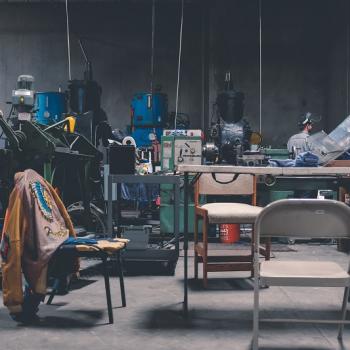 A little while ago James K. A. Smith wrote these words on the website of Comment magazine about his experience playing youth hockey in Canada:
A little while ago James K. A. Smith wrote these words on the website of Comment magazine about his experience playing youth hockey in Canada:
When you’re ten years old, you think this is just part of the furniture of the cosmos; something given, natural, and taken for granted—that Saturday morning clinics and Tuesday night practices are just part of the rhythm of the universe, as if when God said, “Let there be light,” the big klieg lights in the rafters of the arena also came on. You never really think about what sustains all this, and if you do, you just imagine some anonymous “them” holds it all together, a vague, distant “they” who are responsible for all of this.
Who is that distant “they”? As Smith grew older, he realized it was him:
When you’re an adult you realize: this doesn’t just happen. That something as mundane and yet enduring as Embro minor hockey is not a given; it is an institution. It is only because it is sustained by communities. It is bigger than the people who inhabit it, but it also depends on the people who embody it. The “they” you never saw in your youth turn out to just be people like you who have taken the reins and taken ownership. We could only take minor hockey for granted because, in fact, each generation received it anew, owning it, tending it, reforming it, and passing it on to the next generation.
What does this mean for our desire to change the world through our work? We might actually find ourselves–gasp!–doing it through an institution, not in opposition to one:
In a cynical age that tends to glorify “startups” and celebrate anti-institutional suspicion, faith in institutions will sound dated, stodgy, old-fashioned, even (gasp) “conservative.” So Christians who are eager to be progressive, hip, relevant, and creative tend to buy into such anti-institutionalism, thus mirroring and mimicking wider cultural trends (which, ironically, are often parasitic upon institutions!).
And yet those same Christians are rightly concerned about “the common good.” They are newly convinced that the Gospel has implications for all of life and that being a Christian should mean something for this world. Jesus calls us not only to ensure our own salvation in some privatized religious ghetto; he calls us to seek the welfare of the city and its inhabitants all around us. We love God by loving our neighbours; we glorify God by caring for the poor; we exhibit the goodness of God by promoting the common good.
And he gives examples:
Institutions will sometimes be scaffolds to support the weak; sometimes they function as fences to protect the vulnerable; in other cases, institutions are the springboards that enable us to pursue new innovation. Even though they can become corrupt and stand in need of reform, institutions themselves are not the enemy…..To be fruitful and multiply is to begin—and inherit—the institution of the family. To cultivate creation is to fill the earth with institutional life that was begging to be unfurled—in museums and schools, in legislatures and libraries, in universities and unions.
So, not only can you trust grownups, you might realize you’ve become one:
There’s no “them” out there other than (people like) you. All of the folks on the local school board or church council or Little League committee are people just like you who have taken ownership of the institutions that they inherit, recognizing their indebtedness to them and wanting to bless others through them.
What does it mean to you to think that your work might benefit institutions? That you might bless others through institutions? That the Incarnation might have led to institutions? And that no one has ever washed a rental car? Check out the full article at Comment’s website, and some related posts as well.
Image: “San Agustin Church” by Denise, used under a Creative Commons 2.0 License.













